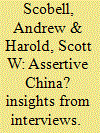| Srl | Item |
| 1 |
ID:
122596


|
|
|
|
|
| Publication |
2013.
|
| Summary/Abstract |
Recent years have witnessed the emergence of a more assertive China. What happened to China's "peaceful rise" and "charm offensive"? What explains the changes in China's foreign policy? According to interviews with Beijing and Shanghai-based analysts, China's assertiveness between 2008 and 2010 can be divided into two waves, each triggered by a different cause. The first wave seems triggered by a sense in Beijing that Washington, DC was more differential to China's interests, and less committed to East Asia. The second wave seems best explained as China's response to what it perceived as a far more assertive and threatening United States. Both waves were amplified by two domestic challenges: Chinese leaders' hypersensitivity to popular nationalism and poor bureaucratic coordination among an expanding number of foreign policy actors.
|
|
|
|
|
|
|
|
|
|
|
|
|
|
|
|
| 2 |
ID:
122595


|
|
|
|
|
| Publication |
2013.
|
| Summary/Abstract |
This article critically evaluates the basis, aspirations, and prospects for bilateral security cooperation between Japan and South Korea. The assumption that common enemies, friends, and interests should have given rise to solid and steadily improving relations between Tokyo and Seoul has been far from realized. Rather, the Japan-ROK relationship continues to be marked by highly volatile behavior - ranging from intense friction to reluctant cooperation - which not only offers a vexing puzzle to the Realist school of international relations but also to the Constructivist one. This article argues that despite the perceived improvement in relations, Japan-South Korea security cooperation is situational and limited; recent developments do not imply a fundamental realignment of the two powers towards one another.
|
|
|
|
|
|
|
|
|
|
|
|
|
|
|
|
| 3 |
ID:
122594


|
|
|
|
|
| Publication |
2013.
|
| Summary/Abstract |
Militias are responsible for some of the most egregious human rights abuses in civil wars. This said, they vary tremendously, and some may serve as a source of security against abusive rebel groups. What distinguishes predatory anti-rebel militias from those which are more or less popular? While previous studies focus on the relationship between militias and states, this study demands equal attention to the militia/rebel relationship. While militias in East Timor were largely predatory, formed at the behest of state forces to attack rebel supporters, militias in Aceh were more diverse, and some formed among ethnic minorities against rebel attacks. This article proposes that militias created where the state dominates are likely to be predatory, while those resisting powerful rebels are more likely to be defensive, popular organizations.
|
|
|
|
|
|
|
|
|
|
|
|
|
|
|
|